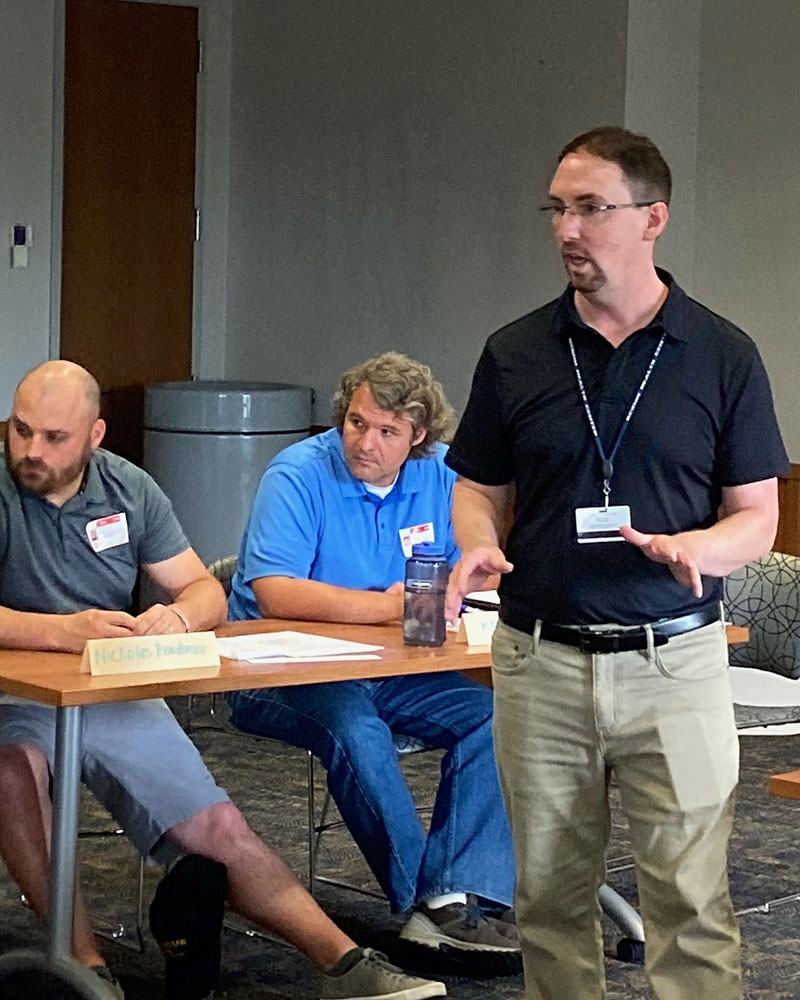Connecticut correction officers and occupational medicine experts are perfecting a program designed to create a workplace culture of improved health, safety and well-being.

Under the Health Improvement Through Employee Control (HITEC) program, front-line workers grouped into design teams use a participatory process to identify their workplace concerns, design solutions, and implement them for the benefit of other workers.
“The HITEC front-line workers participate in creating solutions in their workplaces based on their knowledge of the problems and/or areas that need improvement,” says Janet Caldwell Cover, research assistant, outreach coordinator with UConn Health Occupational and Environmental Medicine, and HITEC advisor. “Interventions created by the design teams are solutions to a problem that are collectively agreed upon and implemented with management approval.”
Workers designed wellness training for sleep, nutrition, substance abuse disorder, and mental health awareness. Other interventions addressed facility air quality, post-incident decompression spaces, and improvements to report-writing areas.
I really value being a part of the HITEC program, which recognizes that the most impactful workplace interventions come from those living it. — Matthew Brennan

HITEC originated in 2006, when researchers from UConn Health and UConn Storrs started working with correction workers, their bargaining units, and Department of Correction administration to form a workplace participatory program. Originating with front-line correction officers, it expanded to include health services, counseling, commissary officers, food services, supervisors, addiction services and education personnel. As the program took shape, it earned the label “for staff, by staff.”
Dr. Martin Cherniack, UConn School of Medicine professor emeritus, was the longtime co-director of the Center for the Promotion of Health in the New England Workplace (CPH-NEW) within UConn Health’s Division of Occupational and Environmental Medicine. He and colleagues from UMass-Lowell have been studying the historically understudied correction workforce.
“I really value what people working on this have done, I think particularly in terms of members of the workforce, supervisors, front-line officers, who’ve done some extraordinary things,” Cherniack says.
The corresponding website, hitec-doc.com, houses resources including downloadable materials, published scientific research, programmatic tools, and video links that introduce the program and aid in the formation of new worker-based teams. It includes a video introduction featuring Cherniack, Caldwell Cover, correction workers, DOC administration and other partners, explaining the program, and showcasing some of the front-line staff involved in the project, reinforcing the “for staff, by staff” mantra:

Alicia Dugan, assistant professor in the UConn School of Medicine Department of Public Health Sciences, has been an academic advisor to the union-based CSC/Correctional Supervisors’ Council design team for more than 10 years. She has served as an educator for their mental health, sleep health, and healthy eating trainings and supported the team in survey design and analysis. Also, she has published numerous peer-reviewed journal articles on her research with HITEC, and presented findings at various national conferences.
“I feel proud to be part of a research program that is nationally recognized for its innovative participatory approach, where creating health improvement initiatives with the engagement of front-line workers has been far more successful than conventional methods.”
The U.S. Surgeon General’s framework for “Workplace Mental Health and Well-Being,” published in the fall of 2022, reports the workplace can be the engine of the mental health of workers, and cites HITEC’s workplace participatory program concept.
In 2021, HITEC went from a federally-funded research program to a more applied, practice-oriented state-funded program.

“The HITEC program provides a voice and process to correctional workers,” says UConn Health research associate Matthew Brennan, who serves as the project manager for HITEC. “It empowers staff to identify concerns and then collaborate with administrators to implement interventions to improve health, safety, and well-being of the workforce.”
Brennan coordinates activities with DOC administrators, five active design teams, and faculty and students from UConn Health, UConn Storrs, UMass-Lowell and Johnson and Wales University. Together with DOC colleagues, he conducts orientations, trainings and supports each design team and facility administrators through the HITEC program.
“I really value being a part of the HITEC program, which recognizes that the most impactful workplace interventions come from those living it,” Brennan says. “The HITEC program enabled me to see some of the challenges that correctional employees encounter. I value the opportunity to empower front-line staff to collaborate with supervisors and administrators to make improvements in their health, safety and well-being.”



